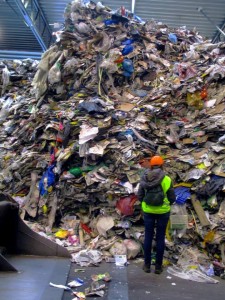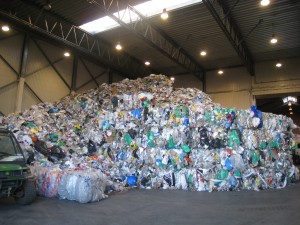There comes a day in every eco-blogger’s life when they must write about recycling. For me, that day is today.
As far as making your life more sustainable goes, recycling is basically “Going Green 101.” It’s where everyone starts. So why do I need to write a post about it?
Because it is still important. Reducing the waste we create is crucially important. Imagine it this way: if you were playing a game where the object was to keep as much trash out of landfills as possible, would you be winning… or losing?
If your answer is anything less than “My name has been on the record boards for the last ten years,” this post probably has something to offer you. It has something to offer me in writing it. What we can recycle and how we can recycle it is changing almost as quickly as the things we consume, and we can all use a refresher now and then.

That’s me, standing next to all the things you can recycle.
But what else goes into that trashcan that’s landfill-bound? Organic matter. Food waste. Things that can be composted. So really, recycling and composting go hand-in-hand. They’re both steps you should consider before you try your hand at a free-throw across the room into the trash bin. Three points for the Earth! (I know nothing about basketball.)
So I’m doing a two week feature guide to recycling and composting. We’ll begin with the eco-friendly practice everyone knows and loves:
Recycling
What can be recycled
Your recyclables are going to come in a number of different categories: there are your staples like paper/cardboard, plastics, glass, and metal, and then there are more unique items like batteries, light bulbs, printer cartridges, and electronics. What is accepted will vary by area, municipality, and recycling center. Make sure to check the rules and regulations for your local town or state. They usually have helpful guides, like this one from Rhode Island. (I tried to find a universal site that listed them for every town, but sadly, such a site does not exist. Someone should make that site happen. But in the meantime, the best recommendation I have is to do a search for “recycling in _______.” Here’s an example of a site for the state of Virginia.)
What cannot be recycled
Except for paper scraps, anything you could compost cannot be recycled. (This means no organic matter like food.) Containers that still contain food or have been contaminated by food that cannot be washed out or off (such as greasy pizza boxes) are also a no. Many areas have specific things they do not recycle, such as certain kinds of plastics or papers—again, make sure to check first.
Where to recycle
Depending on the town, you may put your recycling in a bin alongside your trash on the curb, take it to the “dump” where there are special containers for it, or take it directly to a recycling center. Some items can only be recycled at certain places, such as plastic bags at grocery stores. And remember to keep an eye out when you’re out and about; many public places are installing recycling bins alongside trash bins for your use on the go.
Additional tips
Some recycling centers require items to be sorted when they take them; others don’t. Make sure you know what the requirements are in your area, because not sorting could potentially cause an entire batch of recycling to be contaminated down the line. And if you frequent a public area (such as a shopping center or park) where you see a lot of recyclables getting thrown into the trash because there are no recycling bins, consider starting a campaign to get recycling bins installed there.

A mountain of assorted recycling in a recycling center in Reykjavik, Iceland.
As always, every little bit counts.
By Jessica Edington
